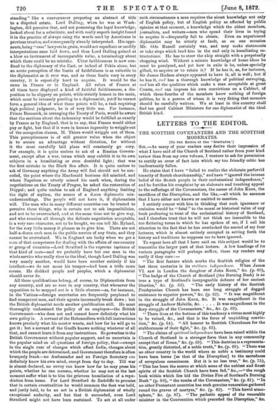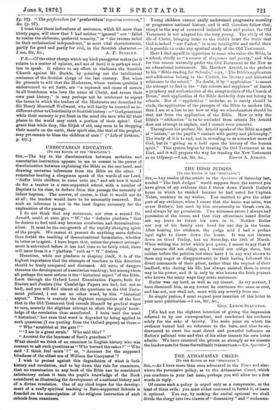LETTERS TO THE EDITOR.
THE SCOTTISH COVENANTERS AND THE SCOTTISH MODERATES.
(TO THE EDITOR OF THIL " SPIOTATOIL)
SLR,—As many of your readers may derive their impression of what I have said of the Church of Scotland rather from your kind review than from my own volume, I venture to ask for permission to rectify an error of fact into which my too friendly critic has inadvertently fallen.
He states that I have "failed to realize the obdurate perfervid tenacity of Scotch churchmanship," and have "ignored the intense belief of the Scotch people in their ecclesiastical independence," and he fortifies his complaint by an elaborate and touching appeal to the sufferings of the Covenanters, the career of John Knox, the sacrifices of the Disruption, and the like,—all which he assumes ' that I have either not known or omitted to mention.
I entirely concur with him in thinking that such ignorance or omission would be " fatal " to the moral or historical value of any book professing to treat of the ecclesiastical history of Scotland, and I therefore trust that he will not think me insensible to the too flattering terms in which he has spoken of me, if I call his attention to the fact that be has overlooked the second of my four lectures, which is almost entirely occupied in setting forth the history and traditions he supposes me to have ignored.
To repeat here all that I have said on this subject would be to transcribe the larger part of that lecture. A few headings of its various paragraphs will perhaps suffice, these my readers may verify if they care :— "The first feature which marks the Scottish religion of the last three centuries is its stubborn independence. When James VI. saw in London the daughter of John Knox," Sco. (p. 60), "The badge of the Church of Scotland (the Burning Bush) is as true a type of Scotland's inexpugnable defence of her ancient liberties," &c. (p. 62). "The early history of the Scottish Presbyterian Church has been one long struggle of dogged resistance to superior powers," &c. (p. 62). " It was magnificent in the struggle of John Knox, &a. It was magnificent in the struggle of Andrew Melville, &c It was magnificent in the fiery struggle of the Covenanters," &c., &c. (p. 63). "There lives at the bottom of this tendency a virtue most highly to be valued, &c., and that is the force of unyielding convic- tion," &c. (p. 64). "All honour to Scottish Churchmen for the stubbornness of their fight," &c. (p. 65).
"The claims of spiritual independence have been raised within the Church of Scotland in a stronger form than in any community except that of Rome," &c. (p. 69). "This doctrine is a representa- tion, greatly distorted, of a noble truth," &c. (p. 69). "There was no other country in the world where so noble a testimony could have been borne [as that of the Disruption] to the sacredness of scrupulous consciences. But it is no less true," &c. (p. 75), "This has been the source at which some of the noblest and finest spirits of the Scottish Church have been fed," &c.,—" the rough husk within which lies hid the Divine Fire of Scotland's Burning Bush" (p. 80), "the tombs of the Covenanters," &c. (p. 81). "In no other Protestant countries has such genuine veneration gathered round the graves of martyrs," &c. (p. 82). "This fervid atmo- sphere," &c. (p. 87). "The pathetic appeal of the venerable minister in the Convocation which preceded the Disruption," &c. (p. 92). "The perferviduin (or prasfervidum' ingenium scotorum," Sr.c. (p. 97).
I trust that these indications of sentences, which fill more than thirty pages, will show that I had neither " ignored " nor "failed to realise the obdurate, perfervid tenacity," or "the intense belief an their ecclesiastical independence," as most vital characteristics, partly for good and partly for evil, in the Scottish character.— P.S.—Of the other charge which my kind panegyrist makes (as it r elates to a matter of opinion, and not of fact) it is perhaps need- less to speak. It relates to my effort to vindicate the Scottish 'Church against Mr. Buckle, by pointing out the intellectual eminence of the Scottish clergy of the last century. But when he proceeds to add that the Moderates, whose various qualities I endeavoured to set forth, are "a reproach and cause of sorrow to all Scotchmen who love the name of Christ, and revere their own past history," it may perhaps not be irrelevant to repeat the terms in which the leaders of the Moderates are described by Sir Henry Moncrieff Wellwood, who will hardly be counted as in- different either to Christianity or Scottish history : —" God grant that while their memory is yet fresh in the mind the men who fill their places in the world may catch a portion of their spirit! God grant that while they, like Elijah of old, may seem to be dropping their mantle on the earth, their spirit also, like that of the prophet, may yet remain to bless the children of men !" (" Life of Erskine," p. 481.)



































 Previous page
Previous page